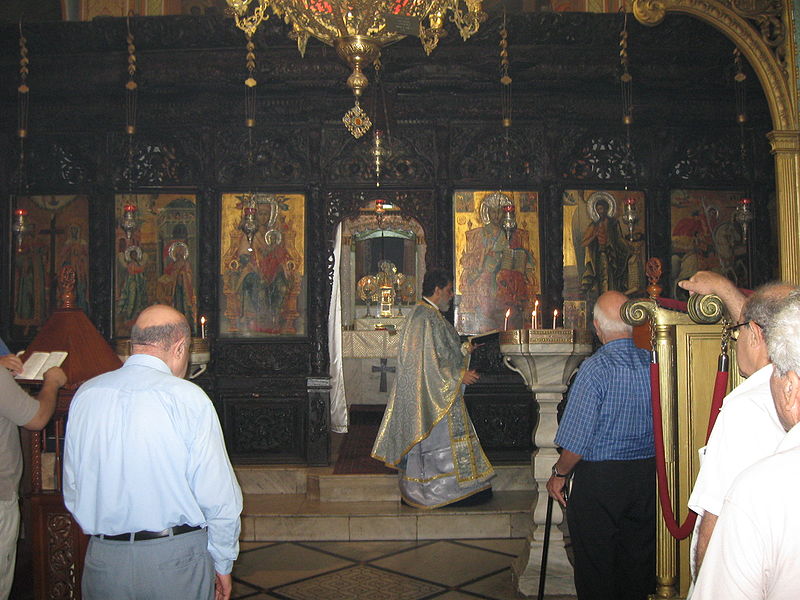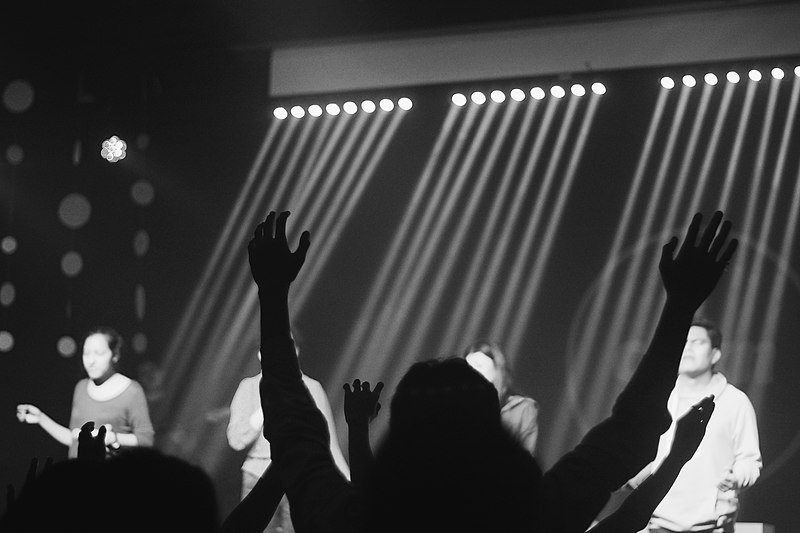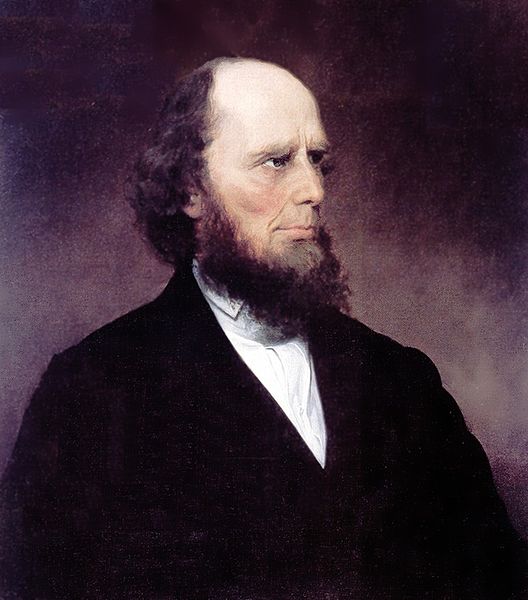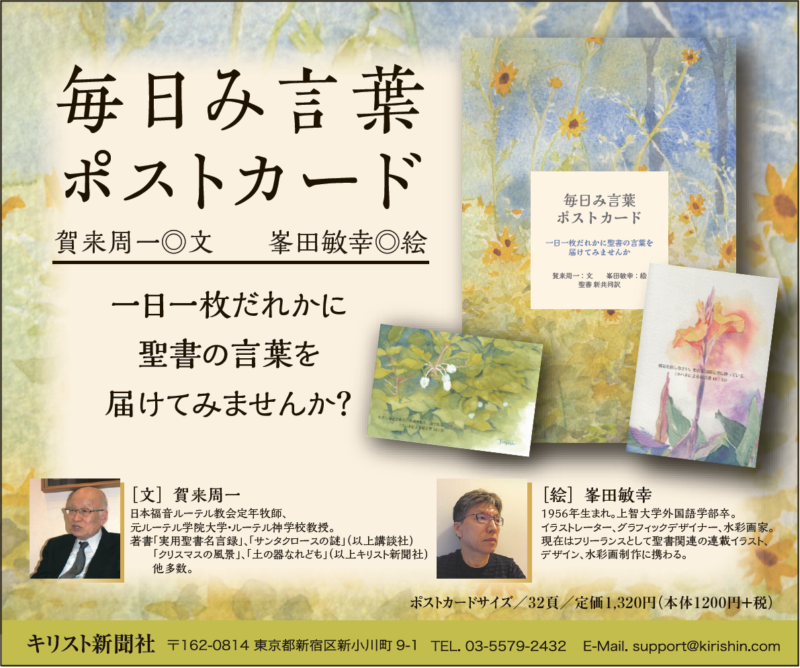私が今まで行った中で最高の礼拝は、シカゴのダウンタウンにある正教会のものだった。そこにいたのは、福音派教会から転会した正教会信徒ばかりだ。そのため、豊かで歴史的な典礼と賛美は福音派的な情熱と結合されていた。私はそこで、自らが神の存在へと持ち上げられた、もっと言えば、神の存在が私たちに降りたように感じたとすら言うことができる。
The absolute best worship service I have ever been to was in an Orthodox church in downtown Chicago. It was full of evangelical converts to Orthodoxy, and so it had the rich, historic liturgy and singing combined with evangelical fervor. I dare say I felt lifted into the presence of God, or better, that the presence of God had descended on us.

正教会の聖体礼儀(写真:Ori~)
私が今まで参加した中で最低の礼拝は、フィラデルフィアの正教会だった。内陣(祭壇がある場所)と身廊(会衆がいる場所)を分ける聖障(イコノスタシス)の背後から司祭たちは聖体礼儀を司(つかさど)っていた。会衆である私たちが求められた唯一の応答は、時おり「アーメン」と唱えることだけだった。覚えている限りでは、私たちが司祭の賛美に加わる場面さえなかった。私はプロテスタント的感覚で怒りを感じ、聖体礼儀の途中で外に出てしまった。
The absolute worst worship service I have ever attended was an Orthodox church in Philadelphia. The priests led the liturgy from behind the iconostasis—a screen of icons separating the sanctuary (where the altar sits) from the nave (where the congregation sits). The only response we in the congregation were called to make was the occasional “Amen.” We didn’t even join the priests in singing as I recall. My Protestant sensibilities were so offended, I walked out in the middle of the service.
こういう経験もあって私は、総合的に言って正教会が他のキリスト教会と比べ、より神をあがめ、賛美する教会だと信じていても、それが完璧には程遠いと思っている。このことは、礼拝のための正しい「道具」を持ち合わせる伝統でさえ、つまずきを与えることを示している。
I relate this experience to say that even though I believe that in general Orthodoxy exalts and glorifies God like no other Christian tradition, it is far from perfect. It also shows that even a tradition that has all the right “tools” for adoration can stumble.
この連載の読者のために言うと、私は先週まで、教会が持っている本質と究極の目的、そしてその捉え直しについて、4部構成でまとめてきた。これから数週間、会衆席と説教壇でこれがどのように実践されているかを探ろうと思う。そして、私たちがどのように人間関係で頻繁につまずいてしまうのかを見、どのように神との関係を持つべきかを提案したい。特に、説教や聖書の読解、聖餐と儀式の持つ力について考察する。その前にまず、福音派スタイルの礼拝が持っている力を見ることから始めよう。福音派的賛美にも長所と短所があるのだ。
For those following the Elusive Presence series, last week I concluded the four-part series that argued for a new way of thinking about the essence and ultimate purpose of the church. For the next few weeks, I want to explore what this might look like in the pew and pulpit. I’ll examine the ways in which we succumb all too often to the horizontal and suggest some ways, upward. I’ll look at the dynamics of preaching, Bible reading, and the sacraments/ordinance, in particular. Let me start, though, with the dynamics of evangelical worship, which has its own highs and lows.

(写真: Fenix2405)
すべてが礼拝
私たちが心の底から求めているのは、神の愛を世界に明らかにすることだ。そういった気持ちを持つことは理解できるし、その多くは素晴らしいものだ。しかし、これまで論じてきたように、聖書に明確に記されている、私たちが最初に行うべきことは、私たちが愛の神の前に立ち、礼拝することだ。また、「ウェストミンスター小教理問答」が述べているように、私たちの一番の目的は「神の栄光を現し、永遠に神を喜ぶこと」だ。この有名な一節の作者は、聖書の歴史の広がりと歴史が向かう方向性に深く影響を受けている。
Our understandable and often impressive yearning is to take the love of God into the world. Yet as I’ve argued, I believe Scripture is clear that our first call is to stand in the presence of our loving God and worship him. Again, as the Westminster Catechism puts it, our chief end is “to glorify God and enjoy him forever.” The framers of that well-known line were deeply influenced by the sweep of biblical history and the end toward which history moves.
最初に注意を向けてほしいのは、十戒のうちの3つか4つ(数え方による)は正しい賛美について語っているということだ。
First note that, depending on how one numbers them, three or four of the Ten Commandments are about proper worship:
あなたには、わたしをおいてほかに神があってはならない。あなたはいかなる像も造ってはならない。上は天にあり、下は地にあり、また地の下の水の中にある、いかなるものの形も造ってはならない。……あなたの神、主の名をみだりに唱えてはならない。みだりにその名を唱える者を主は罰せずにはおかれない。安息日を心に留め、これを聖別せよ。(出エジプト20:3~4、7~8)
You must not have any other god but me.
You must not make for yourself an idol of any kind.
You must not misuse the name of the Lord your God.
Remember to observe the Sabbath. (Ex. 20:3, 4, 7, 8, NLT throughout)

供えのパンの机のレプリカ(写真:Ori229)
さらには、神殿の建て方や装飾の仕方、礼拝の進め方を定めた多くの詳細な律法もある。神は、礼拝に関する決まりに細かすぎるということはないとお思いなのだろう。たとえば、主に供えるパンを載せる机に関する指示を見てみよう。
If that were not enough, add to that the many detailed laws prescribing how the Temple is to be built and adorned, and how worship is to be conducted. God apparently did not think that any detail was too small when it came to worship. Take, for example, the instructions regarding the table that is to hold the Bread of the Presence:
アカシヤ材で机を作りなさい。寸法は縦二アンマ、横一アンマ、高さ一・五アンマ。純金で覆い、金の飾り縁を作る。一トファの幅の枠で四本の脚を補強し、枠にも金の飾り縁を作る。四つの金環を作り、それぞれの脚の外側に付けるが、枠の高さに付け、机を担ぐ棒を通す環とする。アカシヤ材で棒を作って金で覆い、机を担ぐ棒とする。(出エジプト25:23~28)
… make a table of acacia wood, 36 inches long, 18 inches wide, and 27 inches high. Overlay it with pure gold and run a gold molding around the edge. Decorate it with a 3-inch border all around, and run a gold molding along the border. Make four gold rings for the table and attach them at the four corners next to the four legs. Attach the rings near the border to hold the poles that are used to carry the table. (Ex. 25:23–28)
そして詩編。これは礼拝のための賛美歌集にほかならない。
Then there is the Book of Psalms, which is nothing but a hymnbook for worship.
断っておくが、人々があまりに凝(こ)った礼拝に傾倒するとき、特に神への献身が隣人への愛につながらないとき、神は預言者たちを通して神の民を懲(こ)らしめることがある。そして、神がさまざまな表現を用いて「真の礼拝とは、抑圧された者のために正義を求めることだ」と何度も語っているのを私たちは見ることがある。ただ最終的には、預言者にとって倫理的な教えが礼拝に取って代わることは起こり得ず、倫理は真の礼拝を補完するために必要なものと見なされている。
To be sure, in the Prophets, the Lord chastises his people for their overly fastidious worship, especially when their so-called devotion to God was not matched by the love of neighbor. And so we find God often saying, in one way or another, that true worship is to seek justice for the oppressed. But in the end, ethics never replaces adoration in the prophets but is seen as a necessary complement to true worship.

エフライム・リリエン「シオン」
つまるところ、すべては礼拝なのだ。預言者ミカはこう語っている。
In the end, it’s all about worship. As the prophet Micah recorded:
終わりの日に、主の神殿の山は
どの峰よりも高くそびえる。
そこはこの地で最も重要な場所。
山々の頭として堅く立ち、
世界中の人々が礼拝するために大河のようにそこに向かう。(ミカ4:1~2、新リビング・バイブル)
In the last days, the mountain of the Lord’s house
will be the highest of all—
the most important place on earth.
It will be raised above the other hills,
and people from all over the world will stream there to worship. (4:1–2)
歴史の終焉(すなわち歴史の向かう先とその目的)というビジョンは、新約聖書でもほとんどそのまま残されている。「すべての者がひざまずき、すべての舌がイエスを主として告白する」というパウロの幻(フィリピ2:10~11参照)、また「24人の長老が神をあがめ続けた」というヨハネの幻(黙示録4:10参照)、またその間に記されている多くの箇所でも、私たちは礼拝を神の国における素晴らしい行いとして見ている。
This vision of the end of history—meaning both its destination and its purpose—is hardly abandoned in the New Testament. From Paul’s vision of every knee bowing and every tongue confessing Jesus as Lord (Phil. 2) to John’s vision of the 24 elders glorying God (Rev. 4) and many places between, we see worship as the great and wondrous activity in the kingdom of heaven.
特別な感覚を求めて
Looking for that Special Feeling
この10年ほどの間に、福音派のクリスチャンは、聖書が求める「賛美と礼拝の中心性」に目覚めた。この時代に大きく発展したことの一つに、礼拝の仕方がある。「賛美のコーラス」と現代のワーシップ音楽は、それぞれ限界を持ちつつも、私たちの心を神の方向に向ける。これらの曲を歌うとき、顔や腕を上げるように教えられる必要さえない。なぜなら、音楽自体が私たちを上に向けさせ、神を求めて賛美するよう仕向けてくれるからだ。音楽がどんなに教会での礼拝を助けたかを認めないのは、霊性のとぼしい者だけだろう。
In the last decade or so, evangelical congregations have woken up to the centrality of praise and adoration as Scripture commands. One of the great developments of our time is how we worship. “Praise choruses” and contemporary worship music, for all their limitations, aim our hearts and minds in the direction of God. One does not even have to be taught to lift your face or raise your arms as you sing these songs, as the songs themselves often drive one upward to seek and praise God. One has to be a spiritual miser not to recognize how such music has helped the church worship God.

チャールズ・フィニー
しかし、人間関係の誘惑は常に私たちと共にあり、それは私たちの目を欺(あざむ)く姿で礼拝にもやって来る。ワーシップのリーダーたちもしばしば認めているように、彼らはチャールズ・フィニーの『リバイバルの鍵』(いのちのことば社)から手がかりを得ようとする。有能なワーシップ・リーダーは、会衆の感情を操作する方法を知っている。静かに神をあがめる曲からダイナミックな賛美へ、あるいは低音で鼓舞するかのような賛美から、ささやくように静かな瞑想へと導くのだ。時に明白な操作行為があったとしても、そのような礼拝を通じて神に触れられたということを否定する必要はない。しかし、神をテクニックに置き換える誘惑、または最も聖なる存在を探し求めることではなく、浮足立った祈りに埋没する誘惑を私たちは常に持っている。
Yet the temptation of the horizontal is with us always, and it comes in many disguises in our worship. Worship leaders—as they themselves often admit—are tempted to take cues from Finney’s Lectures on Revivals. Every worship leader worth his or her salt knows how to manage the emotions of the congregation, moving them from quiet devotion to raucous praise or from bass-throbbing adulation to whisper-quiet meditation. We don’t have to deny that, despite sometimes obvious manipulation, we’ve been touched by God in such services. But it is a constant temptation to replace God with technique, to seek not the Holy of Holies but mostly devotional exhilaration.
つまり、私たちはしばしば礼拝に対して「霊的な気持ちを与えてもらうこと」を何よりも求めてしまうのだ。賛美の歌詞にだって、きちんと注意を払っているかどうか疑わしい。「栄光を現してください」だとか「あなたの顔を見せてください」といった歌詞の歌はたくさんあるが、本当にそれが何を意味するのか分かっているだろうか。聖書の中で実際に神の栄光に出会った人々は、恐れのあまり地にひれ伏している。たとえば魚の奇跡の後、ペトロは栄光を目にしたこと、そして彼が栄光の者の前にいることを知った。そのとき彼は神をほめたたえたりはしていないし、喜びのあまり涙を流してもいない。彼はひざまずき、イエスに自分から離れるよう懇願したのだ。イエスの栄光は彼にとって、自身の罪深さを明らかにするものだった(ルカ5:8)。
That is to say, many weeks what we mostly want is for worship to give us a good spiritual feeling. I suspect that by our inattention to what we’re singing. We sing various choruses that say, “Bring down your glory” and “show us your face.” But we do not know what we’re asking for. People in the Bible who actually encountered God’s glory fall on the ground in fear. For example, after the miracle of the fishes, Peter knows he has seen glory and that he is in the presence of the Glorious One. He doesn’t give God an ovation. He doesn’t weep with joy. He falls on his knees, begging Jesus to depart from him. The glory of Jesus has made it clear to him that he is a sinful man (Luke 5).

ジョヴァンニ・バッティスタ・ティエポロ「預言者イザヤ」
同じことが、神殿にいたイザヤにも起こっている。神の栄光を垣間見たとき、彼は賛美の歌を叫び出したりはしない。彼は自らの死が近いと思ったのだ。「災いだ。わたしは滅ぼされる。わたしは汚れた唇の者。汚れた唇の民の中に住む者。しかも、わたしの目は、王なる万軍の主を仰ぎ見た」(イザヤ6:5)
The same thing happens to Isaiah in the Temple. When Isaiah is given but a glimpse of God’s glory, he doesn’t break into song, singing a praise chorus. He actually thinks he is about to die: “It’s all over! I am doomed, for I am a sinful man. I have filthy lips, and I live among a people with filthy lips. Yet I have seen the King, the Lord of Heaven’s Armies” (Isa. 6:5).
さらに、モーセに対しては、神自身が自らの顔を見せることを拒否している。それはモーセの終焉につながるからだ(出エジプト33:20)。
In addition, God himself refuses to allow Moses to see his face precisely because it will lead to Moses’s demise (Ex. 33:20).
また、ヨハネ福音書が神の栄光について語る部分は、さらに不安を感じさせるものだ。部分的には確かに、イエスの起こした奇跡について書かれていても、不信心な者がいなくなるほど派手なものだったわけではない。ヨハネ福音書におけるイエスの栄光は、静かで謙虚な栄光であり、信仰の目なしにそれを見分けることは不可能だ。受肉の卑しさ、十字架刑の醜さもまた、栄光を示すものだ。
Even more disturbing is the connection that John’s gospel makes with divine glory. It’s certainly in part about the display of Jesus’ miraculous powers—but they weren’t so spectacular as to prevent some from unbelief. In John’s gospel, Jesus’ glory is a quiet, humble glory that is impossible to discern without faith. This also is glory: the humility of the incarnation and the degradation of crucifixion.
私たちが神の栄光を求めて歌うとき、私たちは神への恐れや、神との生活がもたらす慎ましさや苦悩を知りたいと求めているわけではない。いや、正直に言ってしまえば、私たちが望んでいるのはたいていの場合、宗教的な高揚感だ。私たちは実のところ、神の栄光とは何か、そしてそれが私たちに何をもたらすのかを本当に知りたいと思っているわけではない。(後編に続く)
When we sing asking for God’s glory, we are not asking to know the fear of God and the humble suffering that life in him entails. No, if we’re honest with ourselves, we mostly want a good religious feeling. We really aren’t interested fully in what God’s glory is and what it might do to us.
「クリスチャニティー・トゥデイ」(Christianity Today)は、1956年に伝道者ビリー・グラハムと編集長カール・ヘンリーにより創刊された、クリスチャンのための定期刊行物。96年、ウェブサイトが開設されて記事掲載が始められた。雑誌は今、500万以上のクリスチャン指導者に毎月届けられ、オンラインの購読者は1000万に上る。
関連
































